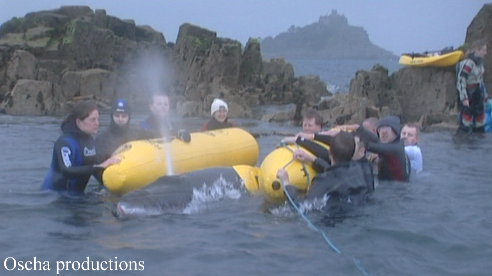|
Rescue of stranded minke whale, Long Rock, Penzance
23rd May 2003
A call was received from the Police at about 17.30 hrs, as a “dolphin” had been reported stranded at Long Rock, Penzance. Staff from the Silver Dolphin Centre, who are trained British Divers Marine Life Rescue, marine mammal medics, arrived to find the animal on Longrock reef, over 200 metres from the beach, with the tide coming in.
One medic went over first, while the rest of the team put together the necessary equipment to carry out a rescue. He found an eighteen-foot long, minke whale, trapped in a rock formation and totally out of the water, at what was now low water.
The team made the creature as comfortable as possible using tarpaulins and seaweed. Visible wounds were checked and monitored, as was the breathing rate. The animal was kept wet, whilst awaiting the rise of the tide. There were abrasions to the tail and head and also a wound on the lower left hand side caused by the whale’s weight pressing on a rock. It was feared the rock had penetrated the whale’s side but as the whale moved it was clear this was not so and no serious damage had been done.
After about an hour the divers from Undersea Adventures arrived with their R-I-B, also RSPCA officer Paul Kempson came out in the water. Filmmaker, Martin Gaunt, was towed out by a local resident using his kayak. Following several messages via mobile telephones the R-I-B was sent to Penzance harbour to collect the vet Paul Riley.
As the water level rose, they managed to slide the sheet under the whale and attach the first pontoon. Medics had to stand chest deep in the water until the whale started to float. Then the whale was moved backwards off the rocks so the second pontoon could be attached. During all of this the animal remained relatively calm, and continued to be monitored and soothed by medics.
Medics then moved the whale in the pontoons out to the R-I-B to be towed into shallow water for the vet to carry out a proper examination. The pontoons were attached to the R-I-B and the boat handler asked for the medics to stay on the rocks, as the boat could not handle all the weight. The pontoons were tied to the side of the boat and they began heading for shallower water in order that an assessment could be done.
Unfortunately, the whale was able to turn the boat and escape from the pontoons and in an attempt to make it back to the sea, the animal began heading back in the direction of the rocks, at one stage it was going at speed towards the last two medics left in the water, swerving only at the last moment and re-stranding further along the reef.
The team made their way over the rocks and back into the rapidly rising waters. The pontoons had been returned from the RIB and these were dismantled in the water and re-positioned around the whale, which still appeared remarkably calm.
Once again the whale in the pontoons, was towed out from the rocks, into the deeper water towards the R-I-B, by the swimming medics. This time a greater distance was left between the boat and the pontoons, with more medics remaining with the whale in the water whilst they moved towards the shore.
When the pontoons reached shallower water a new team of volunteer medics replaced some of the medics who had now been in the water for four hours. The vet was able to give the whale medication to protect against infection. It was suggested beaching the whale but this would have caused more stress for the animal and as an inspection had already been carried out it was decided to tow the whale out past the reef and release it.
Whilst the boat went back to the reef to collect the final seven medics who were left stranded on the rocks, the other medics supported the pontoons and whale in the water until the boat returned.
When the boat returned the pontoons were reattached but the whale had other ideas. It escaped and made its way out to sea past the reef that it had stranded on over five hours earlier. The boat followed it until it lost sight in the darkness. It was now 10.30 pm, and everyone was tired but pleased that the night had ended in success.
A watch was maintained visually & via The Isles of Scilly Steamship Co. & British International Helicopters for the remainder of the weekend around the West Cornwall coast.
Dave Ball - BDMLR / Silver Dolphin Centre
Top
|
